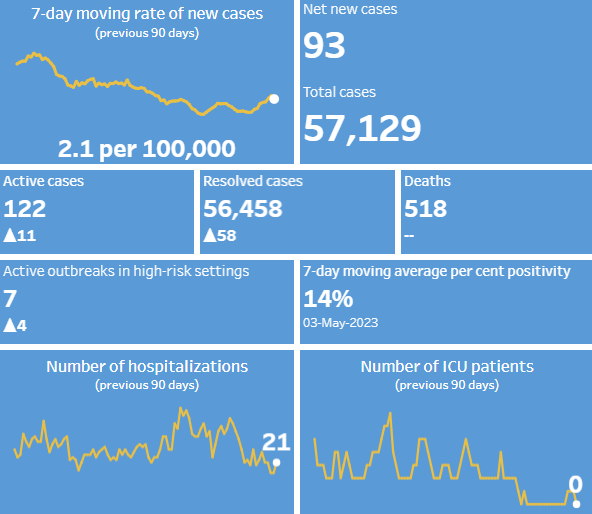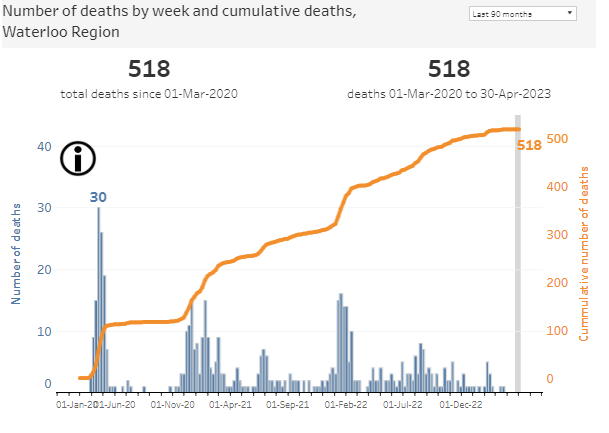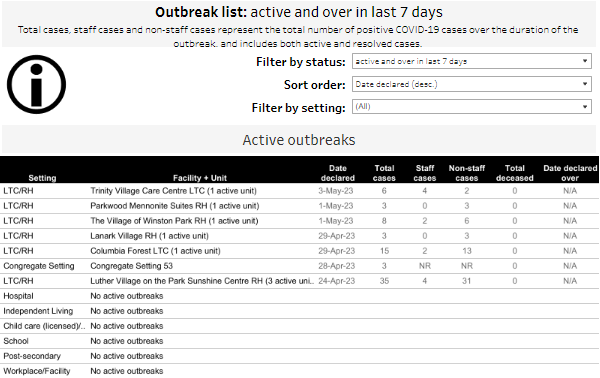Region's COVID-19 ICU admissions remain at zero, Waterloo LTC reports large outbreak
For the third week in a row, the Region of Waterloo is reporting no current Intensive Care Unit (ICU) hospitalizations relating to COVID-19.
The region is also reporting no new COVID-19-related deaths in this week’s dashboard update.
 The current COVID-19 situation in Waterloo region on May 5, 2023. (Region of Waterloo)
The current COVID-19 situation in Waterloo region on May 5, 2023. (Region of Waterloo)
The update comes the same day the World Health Organization (WHO) said COVID-19 is no longer global health emergency.
The WHO first declared an emergency in 2020, after COVID-19 was first discovered in Wuhan, China.
Since then, nearly 7 million people have lost their lives to COVID-19, and more than 765 million cases have been confirmed globally.
"Yesterday, the Emergency Committee met for the 15th time and recommended to me that I declare an end to the public health emergency of international concern. I've accepted that advice. It's therefore with great hope that I declare COVID-19 over as a global health emergency," said WHO Director-General Tedros Adhanom Ghebreyesus.
The WHO's emergency committee first declared that COVID represented its highest level of alert more than three years ago, on Jan. 30 2020.
According to the Government of Canada, just over 52,000 Canadians died throughout the pandemic.
Quebec saw the highest number of COVID-19-related deaths at 17,765, followed by Ontario with 16,472 and Alberta with 5,699.
The province or territory with the lowest reported COVID-19-related deaths was Nunavut with seven, followed by Northwest Territories with 22 and Yukon with 32.
In the Region of Waterloo, 518 people are reported to have died from COVID-19 since March 2020.
 The cumulative number of deaths in Waterloo region linked to COVID-19. (Region of Waterloo)
The cumulative number of deaths in Waterloo region linked to COVID-19. (Region of Waterloo)
“We welcome the news that the WHO has declared the COVID-19 pandemic no longer an emergency. It’s a great milestone in the pandemic journey,” the Grand River Hospital said in a statement. “At Grand River Hospital, we’ve seen fewer patients with COVID-19 coming in, which is encouraging – as of today at 11:45 a.m., we have 636 patients staying in hospital, and just 8 of them have COVID-19. As we move forward, we continue to encourage people to take measures like good hand hygiene and getting their COVID-19 booster vaccines, so we can keep moving in a positive direction.”
The medical officer of health in Wellington-Dufferin-Guelph Dr. Nicola Mercer said the impacts of COVID-19 may not be as severe as they were three years ago, but the pandemic is still far from over.
“People who are seniors, over the age of 65 with underlying medical conditions, unfortunately, we still continue to see people hospitalized. Some people die,” Dr. Mercer said.
“We actually have to learn to sort of come to a middle ground. We don’t want to be super scared of COVID, not leave our house. At the same time, we can’t ignore it and say it doesn’t exist.”
OUTBREAKS STILL OCCURING
The number of active outbreaks in high-risk settings has jumped in the last week, with the region reporting seven current outbreaks. This is an increase of four from last week.
Of these outbreaks, six are at long-term care homes and one is in a congregate settings - a category that includes shelters, group homes and correctional facilities.
 The number of COVID-19 cases found in outbreaks in Waterloo region on May 5, 2023. (Region of Waterloo)
The number of COVID-19 cases found in outbreaks in Waterloo region on May 5, 2023. (Region of Waterloo)
Luther Village on the Park Sunshine is currently reporting 35 COVID-19 cases, of which, four are in staff and 31 are non-staff cases.
Revera Columbia Forest Long Term Care Home is reporting the second-highest COVID-19 cases with 15, of which, two are in staff and 13 are non-staff cases.
With files from CTV News
CTVNews.ca Top Stories

opinion Tom Mulcair: Prime Minister Justin Trudeau's train wreck of a final act
In his latest column for CTVNews.ca, former NDP leader and political analyst Tom Mulcair puts a spotlight on the 'spectacular failure' of Prime Minister Justin Trudeau's final act on the political stage.
B.C. mayor gets calls from across Canada about 'crazy' plan to recruit doctors
A British Columbia community's "out-of-the-box" plan to ease its family doctor shortage by hiring physicians as city employees is sparking interest from across Canada, says Colwood Mayor Doug Kobayashi.
'There’s no support': Domestic abuse survivor shares difficulties leaving her relationship
An Edmonton woman who tried to flee an abusive relationship ended up back where she started in part due to a lack of shelter space.
opinion King Charles' Christmas: Who's in and who's out this year?
Christmas 2024 is set to be a Christmas like no other for the Royal Family, says royal commentator Afua Hagan. King Charles III has initiated the most important and significant transformation of royal Christmas celebrations in decades.
Baseball Hall of Famer Rickey Henderson dead at 65, reports say
Rickey Henderson, a Baseball Hall of Famer and Major League Baseball’s all-time stolen bases leader, is dead at 65, according to multiple reports.
Arizona third-grader saves choking friend
An Arizona third-grader is being recognized by his local fire department after saving a friend from choking.
Germans mourn the 5 killed and 200 injured in the apparent attack on a Christmas market
Germans on Saturday mourned the victims of an apparent attack in which authorities say a doctor drove into a busy outdoor Christmas market, killing five people, injuring 200 others and shaking the public’s sense of security at what would otherwise be a time of joy.
Blake Lively accuses 'It Ends With Us' director Justin Baldoni of harassment and smear campaign
Blake Lively has accused her 'It Ends With Us' director and co-star Justin Baldoni of sexual harassment on the set of the movie and a subsequent effort to “destroy' her reputation in a legal complaint.
Oysters distributed in B.C., Alberta, Ontario recalled for norovirus contamination
The Canadian Food Inspection Agency has issued a recall due to possible norovirus contamination of certain oysters distributed in British Columbia, Alberta and Ontario.


































